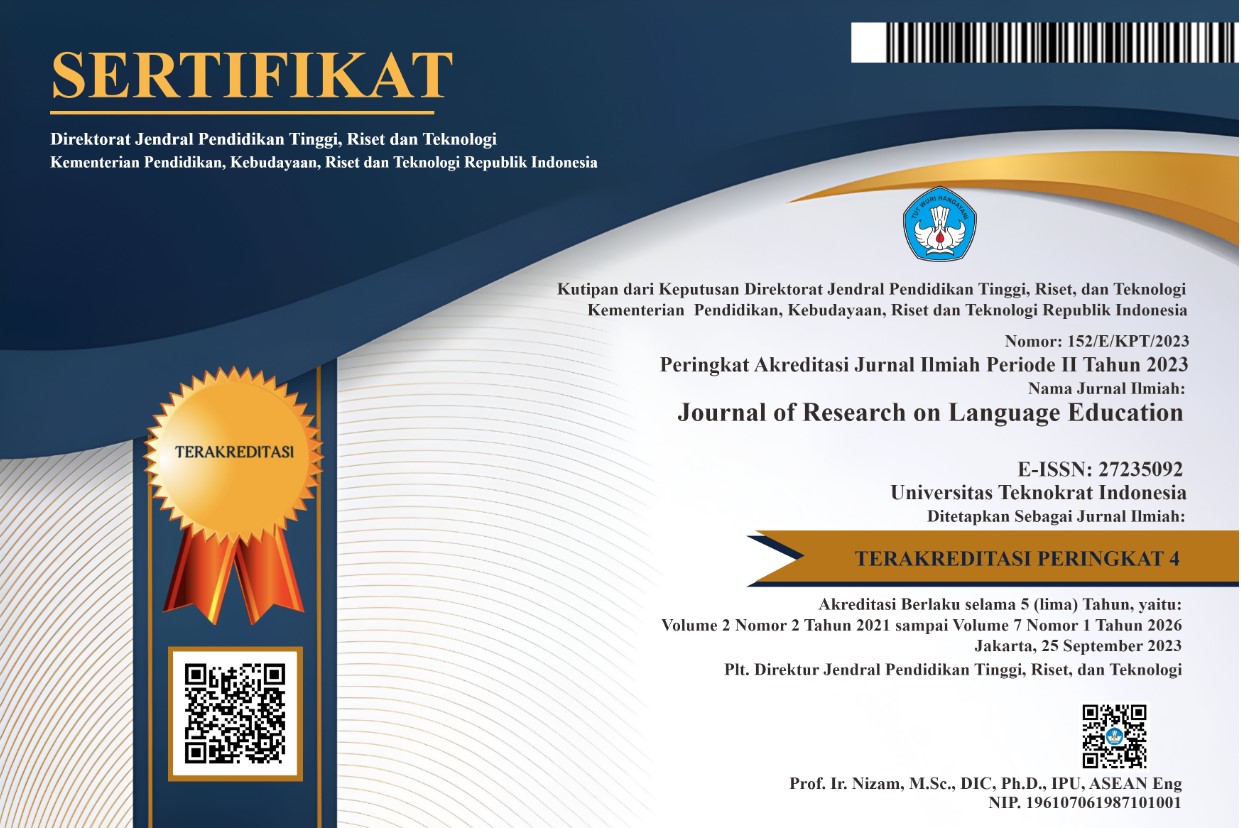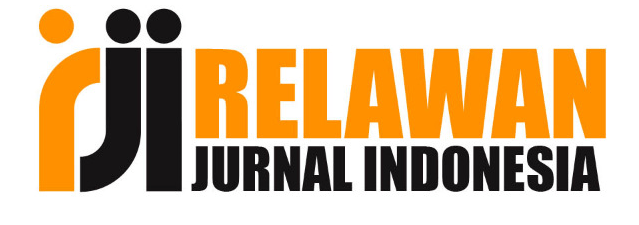ENHANCING STUDENTS’ ENGLISH SPEAKING ABILITY THROUGH VRCHAT GAME AS LEARNING MEDIA
Abstract
Era 5.0 or Society 5.0 is a human-centered technology-based era that aims to create convenient and efficient living circumstances and provide further innovation in the life sustainability area. Era 5.0 is visualized as capable of creating a multinational society, whether in business, social, and educational environments. Thus, English should be noted as a crucial matter needed in communicating and takes part in living within era 5.0 in the future. The current research was conducted because of the limited exploration in the previous study that discusses online game VRChat as a learning medium to enhance students’ English speaking ability. Therefore, this paper aims to fill the gap by investigating and exposing the VRChat game’s value as a learning medium to improve students’ ability to speak English. Mixed method research was applied in the current study to analyze and ensure the VRChat game’s advantages for enhancing students’ speaking ability. Moreover, interviews and testing were used as the instrument in this research. A random sampling of four students who have done taking the FLSP (Foreign Learning for Specific Purposes) course as the current study’s subject. Additionally, the analysis was done using descriptive statistics and hierarchical charts using Nvivo 12 plus. This study showed the use of VRChat games as a learning medium increased students’ ability to speak English, specifically on their accuracy and fluency. This research implies that the VRChat game can support English teaching as the learning media, especially in speaking subjects.
Keywords
Full Text:
PDFReferences
Chuah, Kee-Man., Chen, J. C., Dell, M. Radina. (2017). Developing 3D Acoustic-Based Virtual Environments for the Teaching of English Vocabulary to Visually-Impaired Learners. Global Business and Management Research: An International Journal , 10(8), 157-163.
Alfadil, M. Mohammed. (2017). Virtual Reality Game Classroom Implementation: Teacher Perspectives and Student Learning Outcomes (Doctoral Dissertation). University of Northern Colorado.
Leovaridis, C., Bahnă , M. (2017). Aspects Regarding Virtual Reality as Innovation in Creative Industries. Romanian Journal of Sociology, pp. 157-172.
Nugroho, W. Pujo. (2018). Identitas Roleplayer dalam Game VRChat. Universitas Airlangga.
Cheng, A., Yang, Lei., Andersen, E. (2017). Teaching Language and Culture with a Virtual Reality Game.
Jensen, L., Konradsen, F. (2017). A Review of The Use of Virtual Reality Head-Mounted Displays in Education and Training.
Thilagavathy, R., Veeramani, T., Ramakrishna, B. (2019). Role of Augmented Reality and Virtual Reality in Digital World. International Conference on Science Technology Engineering and Mathematics (ICONSTEM).
Dede, J. Christopher., Jacobson, J., Richards, J. (2017). Introduction: Virtual, Augmented, and Mixed Realities in Education. Smart Computing and Intelligence.
Călin, Răzvan-Alexandru. (2018). Virtual Reality, Augmented Reality and Mixed Reality Trends in Pedagogy. University of Craiova.
Huang, Xiuli., He, Juhou., Liang, Y., Han, Guangxin., Wang, wei. (2018). The Effect of Learning Styles and Scaffolding Strategy on Students’ Achievement in a VR Learning Environment. Shaanxi Normal University, China. DOI: https://doi.org/10.3217/978-3-85125-609-3-34
Xie, H. Di Zou., Wang, Fu Lee. (2018). Future Trends and Research Issues of Technology Enhanced Language Learning: A Technological Perspective. Knowledge Management & E-Learning. 10(4), 426-440.
Nersesian, E., Soryszynski, A., Thompson, U., Lee, J. Michael. (2018). Encompasing English Language Learners in Virtual Reality. New Jersey Institute of Technology.
Reitz, L., Sohny, A., Lochman, G. (2016). VR-Based Gamification of Communication Training and Examination in a Second Language. International Journal of Game-Based Learning, 6(2), 46-59. DOI: 10.4018/IJGBL.2016040104
Daghestani, L. (2013). The Design, Implementation and Evaluation of a Desktop Virtual Reality for Teaching Numeracy Concepts via Virtual Manipulatives. Doctoral thesis, University of Huddersfield.
DOI: https://doi.org/10.33365/jorle.v3i2.2135
Refbacks
- There are currently no refbacks.

This work is licensed under a Creative Commons Attribution-NonCommercial-ShareAlike 4.0 International License.

Articles published in Journal of Research on Language Education is licensed
under a Creative Commons Attribution-ShareAlike 4.0 International License.
English Education Study Program, Faculty of Arts and Education.
Universitas Teknokrat Indonesia
Zainal Abidin Pagaralam 9-11 Bandar Lampung, Indonesia
All rights reserved.








